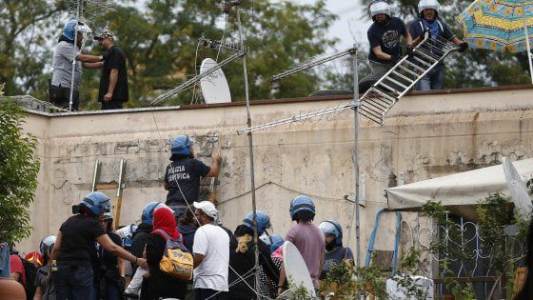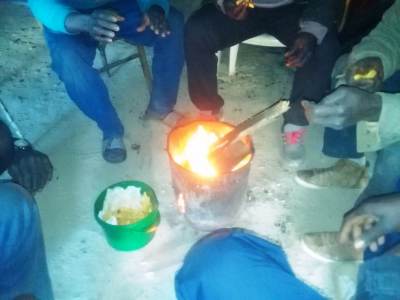Abandon all hope, you who enter here
Maybe, being less hypocritical, we should translate this sentence in various languages and African dialects in order to hand it to migrants who arrive to let them well know what they are going to undergo once arrived on Italian or European shores. Those who died already in the desert or in the sea lived the hardest way the meaning of the words written on the doors of Dante’s “Inferno” (Hell).
Shores that are more and more militarized, with walls that are higher and higher and barbed wires that keep on wounding the hands of those who do not want to surrender and loose their hopes. But hope dies day to day and thousands of people give up quietly and become ghosts in a foreign land. A desire of freedom that turns in another confinement, because the system of hospitality aims to fatten greedy Europeans, not to think about women, men and children who cry for help. We are deaf and the protection system does not let any hope.
Just speaking about Italy: The protection system does not hold water and adding to this the current European policy (closed borders and the treaty of Schengen ignored) migrants are likely to die either on sea or on our roads. It happened only days ago in the countryside of Marsala, where two migrants were run over and abandoned there on the street. But they were children of a lesser god, so no protests nor indignation were aroused. Unfortunately stories like the one in Marsala happen constantly, while migrants become more and more isolated and invisible, leave their hopes deep inside their own souls, unable to react to the abuses and exploitations they undergo.
In these days we were present to the landings (disembarkations) in Palermo and Trapani, where structures held numbers and weight of arrivals at the moment, thanks to the help of a large number of volunteers at ports.
In Palermo the accommodation-machinery allocated migrants in the emergency structures made available by Caritas, that basically did not serve, as migrants immediately left the CAS* to head toward their destinations. Lots of them were Syrian families.
In the Trapanese surroundings, the famous CARA** in Salinagrande has been definitely closed: it was the symbolic place of the Italian reception system where thousands of migrants passed through, and remained when seeking for asylum: a non-place far from real world and people for long years.
The Italian prefecture won its battle after 6 months of delay, and convinced the government to close the CAS in order to open new centres, a lot of them in Marsala, the new core in the Trapanese scenery, or reopen old CAS that had had management troubles, like the one in Poggioreale.
On June 10th we went to Agrigento, authorized at last to inspect some structures. While waiting for the final green light from the prefecture, we noticed more than a dozen young men from african countries in front of the building entrance. Talking to some of them and to the cultural mediator who was with them, we discovered that they were housed in the ‚Next Project‘ structure in Aragona but had come to Agrigento for a peaceful demonstration. The object of their discontent and frustration was that they did not know yet the date of their examination by the regional asylum commission. We learned that the 18 young men (coming mainly from Senegal, Nigeria and Ghana) arrived in Lampedusa in March 2014, then were moved to Aragona: Since then they have been waiting in perennial uncertainty.
Conditions of stress have increased in the centre also because of the absence of documents: people there feel misunderstood and powerless, so they release their frustration towards the workers in the reception centers. Moreover, all the boys complain about poor and bad food and irregularly distributed pocket money.
Through a delegate and a responsible of the centre, at last the party got listening by a prefecture official, who took precise commitments about the date of hearing, ensuring they would have it by July or August. That means that the establishment of the new asylum commission of Agrigento, as expected, slowed down times up to two years before the asylum seekers would be heard or get their documents. According to us, this last centre is going to become another big delusion, as in most of the CAS Siciliy ( and in the SPRAR too) nothing is done in order to promote interaction processes, while the only purpose in them is restraining rage and frustration, that lead people to despair and even to suicide attempts, as it happened in Modica.
On June 11th we visited Pozzo di Giacobbe ( Jacob’s Well). Located just out of Aragona, the small centre has been opened since the beginning of 2013 and now gives hospitality to 17 men ( among them a Dublin-case) coming from Bangladesh, Pakistan, Nigeria, Gambia, Senegal, Ghana, Mali and Eritrea. The centre is in good conditions: clean with enough space. The small number of guests improves relationships and mutual respect among guests and operators, especially toward the social worker who was present during our visit. The contract between the prefecture and CAS is respected in all its details. But similar to the boys from ‚Next Project“ we visited the previous day, the migrants live a highly frustrating situation because they do not know when they will be heard in front of the asylum commission. A Pakistani young man spoke clearly about this problem and it’s consequences: psychological implications such as insomnia, restlessness, anxiety that lead to frustration bound to helplessness, too, because they cannot help families left in their countries, who mainly depend from remittances of those ones in Europe. The long waiting times, stalemate and impotence sensation and the resulting frustrations often lead to conflicts with the operators of the centers, namely with those people who are more closely in contact with the migrants, as we many times ascertained during our monitoring activity. An often paradoxical situation, as their asylum procedure does not depends at all from the operators’ willing, who instead must mediate between migrants and establishment and filter, as much as possible, the desperation of migrants and the inefficiency of the asylum system.
Some critical issues linger, found also in other centers of the surrounding, mainly the decentralization of CAS and the deriving isolation from town and facilities, leading to a difficult inte(g)ra(c)tion between migrants and inhabitants.
The only interaction favours Italians, who often profit by the desperate labor of migrants in exchange for an immediate and reliable result at a cheap price. Few euros for 12 hours of hard work in Marsala or in Aragona and all over Sicily. Unfortunately the burden of the lack of documents often means that a migrant is held in check and blackmailed by people unscrupulous, without humanity, whose only purpose is a greater gain. The current Italian reception system actually favors the most ruthless people.
 On June 10th 384 migrants arrived in Agrigento, passed through the sanitary triage in the famous tent in Porto Empledocle, then were transferred to Villa Sikania. Also here, a lot of them after refreshing and recovering from the long sea travel, restarted towards other destinations, probably to Northern Europe. Still, a great number of them is there. Villa Sikania is the ‚sorting place‘ of Agrigento’s prefecture: all migrants pass through the centre, which is run by the Cometa Association, tied to Acuarinto, who received more than 2 million euros in the time between July and December 2014.
On June 10th 384 migrants arrived in Agrigento, passed through the sanitary triage in the famous tent in Porto Empledocle, then were transferred to Villa Sikania. Also here, a lot of them after refreshing and recovering from the long sea travel, restarted towards other destinations, probably to Northern Europe. Still, a great number of them is there. Villa Sikania is the ‚sorting place‘ of Agrigento’s prefecture: all migrants pass through the centre, which is run by the Cometa Association, tied to Acuarinto, who received more than 2 million euros in the time between July and December 2014.
There are a lot of Syrians, even with their small children and boys from Senegal, Nigeria, Bangladesh, Gambia, Mali. As soon as they leave, other parties arrive, about one hundred persons who arrived recently in Lampedusa. With new arrivals from Lampedusa but also others parts of Europe, keeps the centre of Villa Sikania always crowded. While the identification processes were not done at the port in Agrigento before, now they are made in Villa Sikania’s parking lot. Most of migrants accept to have their fingerprint taken, but Syrian people usually refuse and want to continue their journey northwards.
Most of them lost hope, but fortunately there’s still someone crying, but dreaming despite the killing slowness.
Caterina Bottinelli—Alberto Biondo
Borderline Sicily
*CAS: Extraordinary reception centre
**CARA: Reception Centre for Asylum Seekers
Translated by Fernanda Pecile





